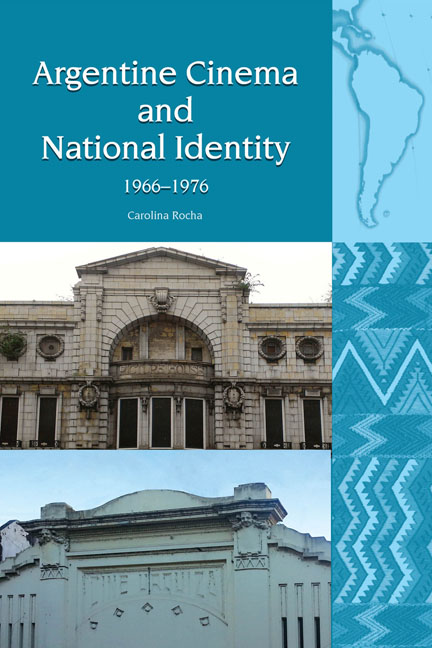Book contents
- Frontmatter
- In Memory of Paulina Piselli (1937–2017)
- Contents
- Acknowledgements
- Introduction
- Section I Argentine History and National Cinema, 1955–1976
- Section II The Cinematic Gauchesque
- Section III Representing Founding Fathers
- 10 Looking for a National Hero
- 11 Güemes, la tierra en armas
- 12 Bajo el signo de la patria
- 13 Juan Manuel de Rosas
- Conclusion
- Bibliography
- Index
13 - Juan Manuel de Rosas
from Section III - Representing Founding Fathers
- Frontmatter
- In Memory of Paulina Piselli (1937–2017)
- Contents
- Acknowledgements
- Introduction
- Section I Argentine History and National Cinema, 1955–1976
- Section II The Cinematic Gauchesque
- Section III Representing Founding Fathers
- 10 Looking for a National Hero
- 11 Güemes, la tierra en armas
- 12 Bajo el signo de la patria
- 13 Juan Manuel de Rosas
- Conclusion
- Bibliography
- Index
Summary
Juan Manuel de Rosas [henceforth Rosas] premiered ten months after the release of Bajo el signo. Unlike his role in Don Segundo Sombra, in this film Antín was a contract director. In 1971, during the shooting of Rosas, he acknowledged that the idea of concentrating on this character came after making Don Segundo Sombra. In a different interview, Antín declared that inspiration for the project came in 1970 when reading American historian Myron Burgin and his Canadian counterpart H.S. Ferns (Saenz Germain, 1971, 24). He then approached historian José María Rosa in October 1970 to invite him to participate in the writing of the screenplay because he wanted to count on the support of a renowned scholar and he admired his passion (‘Para Antín,’ 1971, non. pag.). Antín clarified that the script was finalized after its sixth version: ‘estudiamos las posibilidades industriales del proyecto y reunimos lo necesario para emprenderlo con una sana y tranquila producción’ [We studied the commercial possibilities of the project and gathered the funds necessary for a healthy and smooth production] (‘Para Antín,’ 1971, non. pag.). Such an efficient process would make sense everywhere except in Argentina, where funds for film production and audience research have not been widely used. In recent years, Antín's statements about the film have changed. In conversation with Sández, he stated that he was approached by Diego Muñiz Barreto (1934–1977), an upper-class nationalist who went from being an anti-Peronist and working in a technical position under Onganía's regime to joining the Montoneros and financing the 1973 Peronist campaign. According to Antín, Muñiz Barreto, the film's executive producer, wanted ‘una película ideológica y estridente en la época de Lanusse’ [an ideological and polemical film in the Lanusse period] (Sández, 2010, 92). To achieve this, he chose Rosas (1793–1877), whom historian Hebe Clementi has characterized as the ‘figura más controvertida’ [most controversial figure] (1970, 7) of Argentine history. As a teenager, Rosas took part in the defense of Buenos Aires against the British invasions. He later worked in his family's estancias in close proximity with the gauchos whom he would recruit to guard Buenos Aires from the Federalists in 1820.
- Type
- Chapter
- Information
- Argentine Cinema and National Identity (1966–1976) , pp. 198 - 215Publisher: Liverpool University PressPrint publication year: 2018



